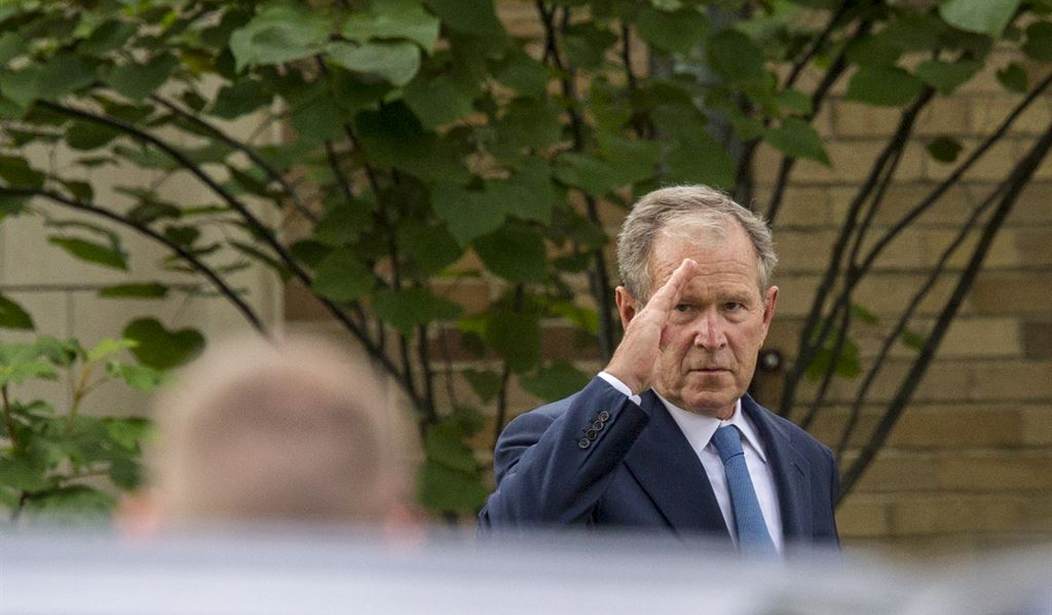It was just a slip of the tongue. Or was it? Like so many such slips, it was revealing. Speaking at an event at his presidential center at Southern Methodist University on Wednesday, former President George W. Bush praised Ukrainian President Volodymyr Zelensky, likened him to Winston Churchill, and then said, “In contrast, Russian elections are rigged. Political opponents are imprisoned or otherwise eliminated from participating in the electoral process. The result is an absence of checks and balances in Russia, and the decision of one man to launch a wholly unjustified and brutal invasion of Iraq. I mean, of Ukraine, heh heh.” Then he added quietly, “Iraq, too. Anyway, uh …” To laughter from the audience, Bush then said, “75,” a reference to his age. (A side note: Old Joe Biden is 79.)
Former President George W. Bush: “The decision of one man to launch a wholly unjustified and brutal invasion of Iraq. I mean of Ukraine.” pic.twitter.com/UMwNMwMnmX
— Sahil Kapur (@sahilkapur) May 19, 2022
The most extraordinary aspect of this was not Bush’s initial slip, but the fact that he added “Iraq, too” after correcting himself. So does Bush, after all these years, finally concede that the invasion of Iraq was “unjustified,” not to mention “brutal”? In his January 29, 2002 State of the Union address, Bush called North Korea, Iran, and Iraq an “axis of evil,” and declared, “By seeking weapons of mass destruction [WMD], these regimes pose a grave and growing danger.” He added, “Iraq continues to flaunt its hostility toward America and to support terror. The Iraqi regime has plotted to develop anthrax and nerve gas and nuclear weapons for over a decade.”
In his memoir, Decision Points, Bush recalled, “The conclusion that Saddam had WMD was nearly a universal consensus. My predecessor believed it. Republicans and Democrats on Capitol Hill believed it. Intelligence agencies in Germany, France, Great Britain, Russia, China, and Egypt believed it.” Chemical warheads were ultimately found in Iraq, but only after the Bush administration had suffered immense political damage from claims that they were not found, and that Bush and his associates had lied about their presence. What’s more, others contended that what was found in Iraq were chemical weapons that had been manufactured before 1991, and were not evidence of an ongoing program that Saddam was conducting.
The Bush administration was likewise hit for claiming that Saddam Hussein and Osama bin Laden had worked together. Dick Cheney said as late as 2014 that Saddam “had a ten-year relationship with Al Qaeda.” The 9/11 Commission, however, stated that “we have seen no evidence” that the contacts between the two “ever developed into a collaborative operational relationship.”
So does Bush now regret going into Iraq? If his under-his-breath quip is to be taken seriously, then he does. And indeed, if he had wanted to strike the countries that really were responsible for 9/11, he wouldn’t have invaded Iraq and Afghanistan; he would have invaded Saudi Arabia and Iran. The Saudi involvement in 9/11 has for two decades now been the subject of intense speculation. On Sept.11, 2021, the FBI at long last made public a memo detailing evidence of a Saudi role in the 9/11 attacks. The Wall Street Journal reported that “a Saudi man under investigation at the time, Omar al-Bayoumi, had checked into a Culver City, Calif., hotel a month before the hijackers’ arrival, with a man whose phone numbers were linked to a spiritual adviser to a Bin Laden lieutenant, the memo said. Both men had relationships with the Saudi Consulate in Los Angeles.”
Another possible Saudi agent, Osama Bassnan, who “has many ties to the Saudi government” and was also a supporter of Osama bin Laden, boasted that he did more for al-Mindhar and al-Hamzi than al-Bayoumi did. He also “reportedly received funding and possibly a fake passport from Saudi government officials.” The report says that at one point, “a member of the Saudi Royal Family provided Bassnan with a significant amount of cash,” and that “he and his wife have received financial support from the Saudi ambassador to the United States and his wife.” That ambassador was Prince Bandar, about whom the New York Times later noted, “No foreign diplomat has been closer or had more access to President Bush, his family and his administration than the magnetic and fabulously wealthy Prince Bandar bin Sultan of Saudi Arabia.”
Related: What Happened to Dick Cheney?
Iran’s role in 9/11 has been covered up as well. On Dec. 22, 2011, U.S. District Judge George B. Daniels ruled in Havlish, et al. v. bin Laden, et al. that Iran and Hizballah were liable for damages to be paid to relatives of the victims of the 9/11 attacks. Daniels found that both the Islamic Republic and its Lebanese proxy had actively aided al-Qaeda in planning and executing the attacks.
A defector from Iran, Abolghasem Mesbahi, testified that during the summer of 2001 he received messages from Iranian government officials regarding a plan for unconventional warfare against the United States. The plot was entitled Shaitan dar Atash (“Satan in Flames”) and involved a plan to hijack three passenger jets and crash them into the World Trade Center, which jihadis took to be the center of American commerce; the Pentagon, the center of America’s military apparatus; and the White House.
A classified National Security Agency analysis referred to in the 9/11 Commission report reveals that eight to 10 of the 9/11 hijackers traveled to Iran repeatedly in late 2000 and early 2001. The 9/11 Commission called for a U.S. government investigation into Iran’s role in 9/11, but none was ever undertaken.
So if Bush’s quip revealed his true sentiments, it’s perfectly understandable that he would be experiencing regret. He didn’t hit the real sources of the attack on the United States, and we are still dealing with the consequences of that today.










Join the conversation as a VIP Member